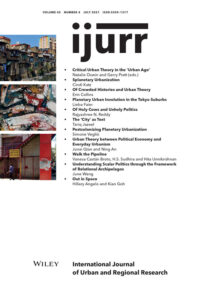This article contributes a feminist analysis of temporal closure to lively debates within critical urban theory. I argue that in both urban politics and urban theory, claims to a singular and totalizing historical arc flatten the heterotemporalities integral to urban life and ultimately contribute to the evacuation of a diversity of lived experience from the center of each. This argument is grounded in the empirics of contentious land politics in and around Phnom Penh, Cambodia. Through my analysis I demonstrate that the erasure of women’s histories through temporal closure and the fixation on their bodies through patrimonial claim making are two sides of an urban politics that seeks to foreclose, name and claim. In this article, written in critical dialogue with planetary urban theory, I advance from this situated analysis to advocate for a crowded field of urban theory, animated by embodied analyses of time built from the heterotemporal and polyvalent lived reality of diverse urban contexts. Crowded urban theory, I argue, makes space for theory building and theory repurposing without scripting the story in advance.

